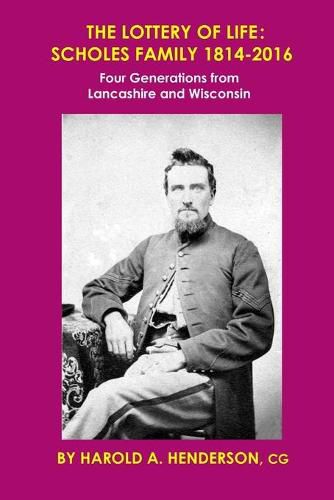Readings Newsletter
Become a Readings Member to make your shopping experience even easier.
Sign in or sign up for free!
You’re not far away from qualifying for FREE standard shipping within Australia
You’ve qualified for FREE standard shipping within Australia
The cart is loading…






This title is printed to order. This book may have been self-published. If so, we cannot guarantee the quality of the content. In the main most books will have gone through the editing process however some may not. We therefore suggest that you be aware of this before ordering this book. If in doubt check either the author or publisher’s details as we are unable to accept any returns unless they are faulty. Please contact us if you have any questions.
William Scholes (1814-1864), a cotton carder in one of the dark Satanic mills of the Industrial Revolution in England, won a workers’ lottery on New Year’s Day 1849. That fall, he and wife Ann Mills (1814-1875) and their children arrived in central Wisconsin with high hopes and few skills. In 37 chapters, The Lottery of Life follows the ancestral couple and their descendants among them teachers, telegraphers, engineers, homesteaders, active union members, farmers, inventors (from farm equipment to recycling fluorescent lights), an encyclopedia manager, and a world authority on glass.
$9.00 standard shipping within Australia
FREE standard shipping within Australia for orders over $100.00
Express & International shipping calculated at checkout
This title is printed to order. This book may have been self-published. If so, we cannot guarantee the quality of the content. In the main most books will have gone through the editing process however some may not. We therefore suggest that you be aware of this before ordering this book. If in doubt check either the author or publisher’s details as we are unable to accept any returns unless they are faulty. Please contact us if you have any questions.
William Scholes (1814-1864), a cotton carder in one of the dark Satanic mills of the Industrial Revolution in England, won a workers’ lottery on New Year’s Day 1849. That fall, he and wife Ann Mills (1814-1875) and their children arrived in central Wisconsin with high hopes and few skills. In 37 chapters, The Lottery of Life follows the ancestral couple and their descendants among them teachers, telegraphers, engineers, homesteaders, active union members, farmers, inventors (from farm equipment to recycling fluorescent lights), an encyclopedia manager, and a world authority on glass.